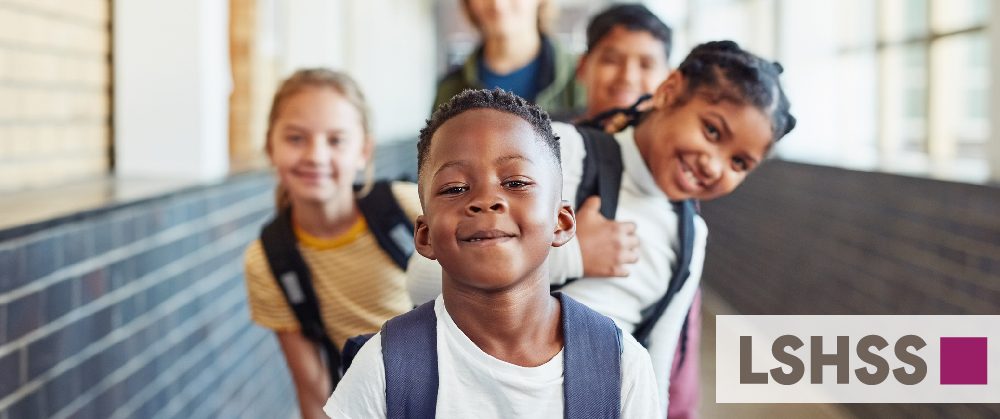Students who speak African American English (AAE) face a number of challenges in the school environment—from a mismatch between home and school language to negative attitudes about AAE in the classroom. One of two forums in this month’s issue of Language, Speech, and Hearing Services in Schools (LSHSS) explores the role that speech-language pathologists (SLPs) can play in serving these students, particularly in collaboration with other professionals.
The forum, titled “Serving African American English Speakers in Schools Through Interprofessional Education & Practice,” contains 11 articles. Guest Editor Monique T. Mills writes “This forum [. . . ] will help researchers, parents, and school-based practitioners communicate in ways that are synergistic, collaborative, and transparent to improve educational outcomes of AAE speakers” (Mills, p. 1).
Three articles look at the language and literacy performance of students who speak AAE from preschool through Grade 5. After an introduction by Mills, a tutorial by Holt and Asagbra discusses using community-based participatory research to train interventionists to provide reading lessons to children in low-resource communities. Later, Hamilton and DeThorne describe how the nonverbal communication of a black male kindergartner was interpreted by a teacher who saw his behavior as a problem in the classroom. Then, Mills and colleagues present the results of in-depth interviews with parents and teachers of Black children in second grade, finding opportunities for interprofessional practice (IPP) between teachers, parents, and researchers.
It’s important to recognize language variations within AAE in order to better track the language skills of students who use the dialect. In their article, Newkirk-Turner and Green detail how AAE develops in different contexts and under different elicitation conditions. Later, Maher et al. compare four current approaches to recording AAE production.
Traditional language assessments may not accurately measure language development of children who speak AAE; fortunately, this forum also explores dialect-fair language measures. Overton et al. show how to use Computerized Language Analysis (CLAN), a free software program, to track multiple grammatical measures in preschoolers who speak AAE, even finding a dialect-fair way to index developmental language disorder (DLD). Immediately following is an article in which Mahurin-Smith et al. also use CLAN, this time to look at rare vocabulary in spoken narratives as a dialect-fair index of language.
Two articles in the forum encourage school-based practitioners and stakeholders to use methods that are more culturally relevant for their students who speak AAE. Diehm and Hendricks examine teachers’ pedagogical beliefs about AAE and efforts to correct its use in the classroom. Later, Hendricks and Jimenez look at how teachers and researchers can work together to learn more about students’ dialect use and language ability.
The final article of the forum by Byrd and Brown looks at an interprofessional approach to dialect-shifting instruction. The authors point to dialect-shifting instruction as a method to both lessen the impact of language mismatch between home and school languages and validate AAE as an academic dialect.
We’d like to thank Monique T. Mills for her work bringing this forum together. You can hear a conversation with Dr. Mills discussing the forum, as well other topics in the area of AAE in the schools, under “Related Media” below.
Teachers, school-based SLPs, and administrators can improve outcomes for students who speak AAE in their schools, but it isn’t a job for a single person or even a singular profession. We hope you enjoy this timely forum—and that it inspires both researchers and practitioners interested in collaborating with other professionals to make the school experience a more successful one for students who speak AAE. You can read the entire forum here, or explore the individual articles below.
References
Mills, M. T. (2021). Forum: Serving African American English speakers in schools through interprofessional education & practice. Language, Speech, and Hearing Services in Schools, 52(1), 1–3. https://doi.org/10.1044/2020_LSHSS-20-00161
Explore the Forum
Byrd, A. S., & Brown, J. A. (2021). An interprofessional approach to dialect-shifting instruction for early elementary school students. Language, Speech, and Hearing Services in Schools, 52(1), 139–148. https://doi.org/10.1044/2020_LSHSS-20-00060
Diehm, E. A., & Hendricks, A. E. (2021). Teachers’ content knowledge and pedagogical beliefs regarding the use of African American English. Language, Speech, and Hearing Services in Schools, 52(1), 100–117. https://doi.org/10.1044/2020_LSHSS-19-00101
Hamilton, M.-B., & DeThorne, L. (2021). Volume and verve: Understanding correction/behavioral warnings in teacher–child classroom interactions involving an African American kindergarten student. Language, Speech, and Hearing Services in Schools, 52(1), 64–83. https://doi.org/10.1044/2020_LSHSS-19-00105
Hendricks, A. E., & Jimenez, C. (2021). Teacher report of students’ dialect use and language ability. Language, Speech, and Hearing Services in Schools, 52(1), 131–138. https://doi.org/10.1044/2020_LSHSS-19-00113
Holt, Y., & Asagbra, E. (2021). Implementing dialogic reading intervention through community-based participatory research: A tutorial. Language, Speech, and Hearing Services in Schools, 52(1), 4–15. https://doi.org/10.1044/2020_LSHSS-19-00100
Maher, Z. K., Erskine, M. E., Byrd, A. S., Harring, J. R., & Edwards, J. R. (2021). African American English and early literacy: A comparison of approaches to quantifying nonmainstream dialect use. Language, Speech, and Hearing Services in Schools, 52(1), 118–130. https://doi.org/10.1044/2020_LSHSS-19-00115
Mahurin-Smith, J., Mills, M. T., & Chang, R. (2021). Rare vocabulary production in school-age narrators from low-income communities. Language, Speech, and Hearing Services in Schools, 52(1), 51–63. https://doi.org/10.1044/2020_LSHSS-19-00120
Mills, M. T. (2021). Forum: Serving African American English speakers in schools through interprofessional education & practice. Language, Speech, and Hearing Services in Schools, 52(1), 1–3. https://doi.org/10.1044/2020_LSHSS-20-00161
Mills, M. T., Moore, L. C., Chang, R., Kim, S., & Frick, B. (2021). Perceptions of Black children’s narrative language: A mixed-methods study. Language, Speech, and Hearing Services in Schools, 52(1), 84–99. https://doi.org/10.1044/2020_LSHSS-20-00014
Newkirk-Turner, B. L., & Green, L. (2021). Language use and development in third-person singular contexts: Assessment implications. Language, Speech, and Hearing Services in Schools, 52(1), 16–30. https://doi.org/10.1044/2020_LSHSS-19-00109
Overton, C., Baron, T., Zurer Pearson, B., & Bernstein Ratner, N. (2021). Using free computer-assisted language sample analysis to evaluate and set treatment goals for children who speak African American English. Language, Speech, and Hearing Services in Schools, 52(1), 31–50. https://doi.org/10.1044/2020_LSHSS-19-00107









